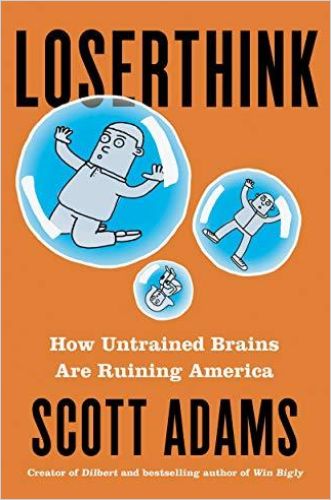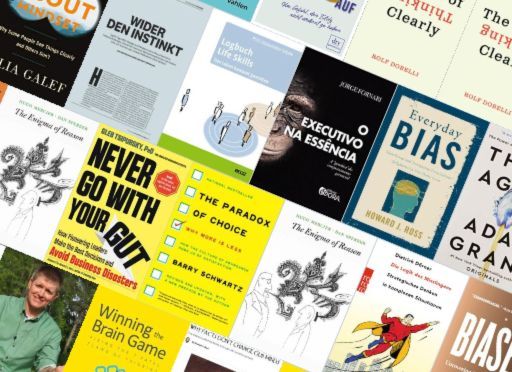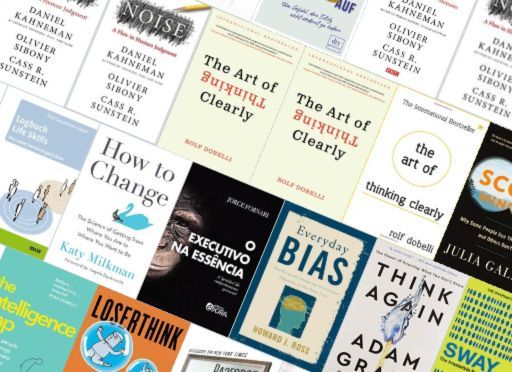Dilbert creator Scott Adams offers slightly cranky advice for thinking clearly and productively.

Curmudgeonly Common Sense
Scott Adams created the comic strip Dilbert – one of the most popular newspaper comic strips of all time – after working for 16 years in the technology industry. His best-selling books include The Dilbert Principle and How to Fail at Almost Everything. Through his character Dilbert, Adams makes his living mocking bad business management practices. In this sincere, slightly cranky self-help book, he explains how many smart, educated, well-intentioned people engage in what he dubs “loserthink”: an unproductive mind-set in which a person cannot consider the world beyond his or her own knowledge “bubbles.” Adams urges you to break free of these “mental prisons” by considering how professionals in different fields solve problems. He cites psychologists, historians, scientists, entrepreneurs and economists.
Unproductive Thinking
Adams clarifies that loserthink describes a way people think, not people themselves. He cautions you to beware of experts in any domain that require complex thinking and huge sums of money.
Most concerned citizens believe climate scientists regarding global warming because of their expertise. Adams maintains that climate scientists don’t always agree about every issue because their prediction models combine science, math, human judgment, and both good data and incomplete data. Adams may be hinting at climate change denial, or he may be suggesting that you can’t expect unanimity in any scientific endeavor; it’s hard to tell.
Bubble
Most people, Adams asserts, live in a bubble. The people in their bubble think as they do, and the news and social media they select reinforce their views. It’s also true, he observes, that two people can view the same data, hear the same arguments and reach completely different conclusions. Adams doesn’t find this particularly tragic. He cites it to remind you to try to think outside your usual patterns.
We humans think we are good judges of what others are thinking. We are not. In fact, we are dreadful at it.Scott Adams
Adams names another indicator that will tell you if you’re practicing loserthink: if you believe you can read other people’s minds or guess their motivations, watch out.
History
Those in charge write history, Adams believes, and they distort it to keep themselves in power. Worldwide, people believe they alone receive accurate history and that everyone else is misinformed. Adams argues further that you can’t predict the future by looking at the past. Anything can appear inevitable – until it’s not. Learn from the past, the author urges, but focus on the future.
Multiple Variables
Given his tech background, Adams admires engineers because they remain aware of multiple variables. Common situations for defaulting to a single variable, the author notes, include trying to understand why a relationship isn’t working or to determine the motivations of your family and friends. Complex situations – climate change, economics and elections – are multiple-variable events.
Small Steps
People think they make decisions with logic and reason, but Adams is adamant, as are many current self-help authors, that emotion drives everyone. Individuals believe they are rational and everyone else is irrational.
Truth has two important dimensions: 1) accuracy and 2) direction. If you dont know which of these dimensions is more important, you might be in a mental prison.Scott Adams
When people who are lazy or who smoke marijuana want to get off the couch but can’t, Adams calls this “couch lock.” This occurs when you want to take action, but can’t find the motivation to start. Adams recognizes that this can happen when changing jobs, moving, starting college or graduate school, or trying to find a mate. For major changes, he recommends breaking big tasks down into smaller chunks and taking one small step at a time.
Adams makes the case that entrepreneurs, whom he clearly admires, dabble in a variety of skills, including economics, management, sales, psychology, design, art, writing, persuasion, marketing and publishing. Learning new skills boosts your confidence and opens career opportunities for you.
He maintains that some entrepreneurs fail intentionally to find out how to succeed – that seems unlikely, but he’s on firmer ground contending that a potential entrepreneur who is too afraid to try will never succeed. An entrepreneur who tries 10 different start-ups, Adams is certain, will succeed with at least one of them.
Naturally Skeptical
Scientists are skeptical of anecdotal evidence. Noting that leads Adams to identify another form of loserthink: believing you can detect a pattern or trend based on observing a few cases – that is, relying on anecdotal evidence, rather than hard data.
People who are trained in decision-making know it is not rational to ask someone to prove a negative. So if you find yourself demanding that others do so, you are practicing loserthink.Scott Adams
Be like a scientist, Adams counsels: They envision the opposite of their suppositions and change their theories when they discover new data. By training, economists, doctors, engineers and scientists know how to make valid comparisons. Lay people, Adams bemoans, often commit the decision-making mistake of comparing something to nothing or of ignoring a proposal’s costs or its benefits.
Don’t Judge
Taking things out of context leads to loserthink. Adams offers the supremely commonsense advice to wait a couple of days after a big news story breaks before you form an opinion. Initial reporting, he explains, often lacks context. Don’t judge people for being wrong, but on how they learn from their mistakes. Adams suggests heeding the “48-hour rule.” Everyone deserves 48 hours to clarify, correct or apologize for an offensive opinion.
Adams, not Dilbert
If you think of Dilbert, the cartoon character, as an oppressed Everyman, then seeing his creator constantly push himself, his degrees, his health issues and his vaguely pro-Trump politics into this self-help narrative may seem somewhat jarring. Adams writes as if he’s determined that no one will confuse him with his bumbling, cartoon alter ego. He wants readers to understand that Adams, unlike Dilbert, can function in the world and hold strong political views. Your interest in Adams as a person and your alignment with his opinions may determine how helpful you find his advice.










